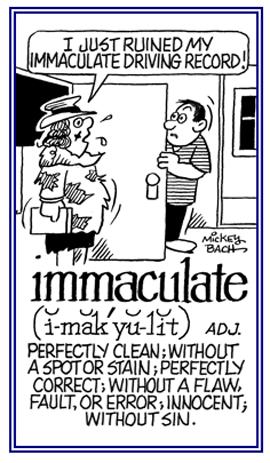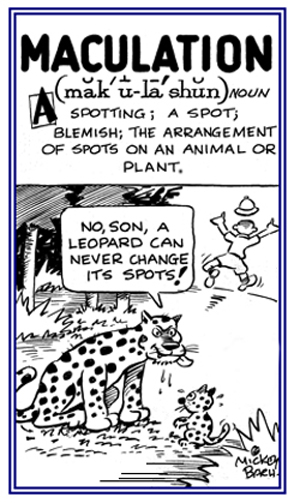macul-, maculat-
(Latin: spot, mark, stain, blot, blemish, mesh; the original meaning of macula seems to have been, "a soiled spot, a spot to be cleaned")
2. Descriptive of a person who is free of bad characteristics; pure: The saint had an immaculate reputation for her work among the poor and homeless people.
3. Relating to something which is free from faults or errors: The football team played an immaculate game, committing no misplays or fouls.
4. Referring to plants or animals which have no markings: The new bird Jim spotted in the forest had a smooth immaculate black body with no flecks, dapples, streaks, or stripes.

Go to this Word A Day Revisited Index
so you can see more of Mickey Bach's cartoons.
The macula of the retina includes the light-sensitive layer of tissue at the back of the eye and usually, it is in the center of the retina.
When people read, light is focused on the macula where millions of cells change light into nerve signals which tell the brain what is being seen.
The public health nurse noticed the presence of macula ceruleae among her street or homeless clients and reported this to the local health authorities.
Usually macular degeneration doesn't cause blindness because only the central area of vision is affected.
Injury that causes macula degeneration usually decreases the ability to see straight ahead clearly and sometimes it makes it difficult to read, to drive, or to perform other daily activities that require good central vision.
Macular degeneration normally affects both eyes, either simultaneously or one eye then the other one later.
2. To spot or to mark with changes in the color of skin that is neither raised nor depressed, or any anatomical structures having the form of a spot or stain: The disease caused the patient’s skin to maculate with dark brown spots in a distinctive pattern.

